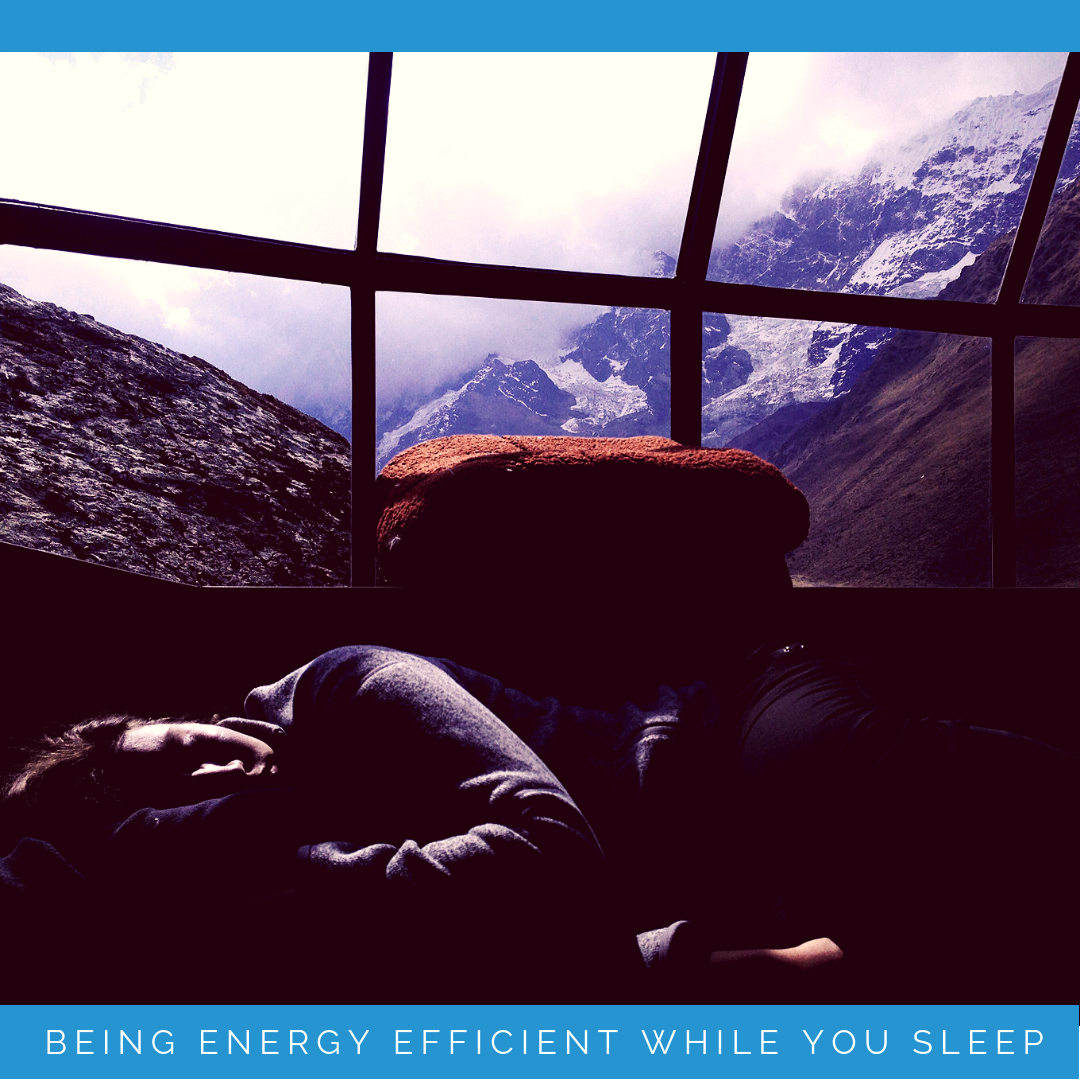Being Energy Efficient While You Sleep
We are all aware that wasting our planet’s resources by overusing energy is proving to be catastrophic, not to mention expensive. Likewise, we are also aware that not getting a good night’s sleep is detrimental to our health. Sleep deprivation has been linked to higher blood pressure, obesity, and even cancer. It causes the bodies’ restorative processes to suffer and our overall health to decline.
So how to do we achieve both a good night’s sleep and avoid over-dependence on the A/C or Heat when it comes to bedtime? Here are some helpful hints to consider.
The Perfect Sleep Environment
Whether its summer or the wintertime, the recommended room temperature for a good night’s sleep is around 60 degrees. This may be easy to achieve in moderate climates like southern California, but other places in the United States and around the globe, find that more diverse weather is normal.
The first thing you want to do is make sure that any windows or doors in your bedroom that connect directly to the outside are thoroughly sealed from air flow. These small and almost invisible gaps can raise or lower the room temperature considerably. When it’s not a breezy 60 degrees out, you want to have those windows and doors closed up tight.
An easy way to check the seal is to close everything up and turn off any fans, A/C or heaters and hold a lit birthday candle up next to the window or door. With a slow motion, move the candle around the outside of the door or window where the glass meets the frame. If the candle starts flickering, you have a leak you want to get fixed.
Another thing to consider, to help insulate your room, are thermal curtains. With added layers and an insulator, these curtains insulate your room, and protect themselves from sun fading at the same time.
Room lighting is something that is often forgotten when considering the bedroom setup. It’s important to have bright lights for when you are awake and active, but that hour or so when you are getting into your bedtime routine, you need dim lighting. If you don’t have the choice of a dimmer switch or a lower wattage lamp, consider candles, but make sure to keep them away from anything flammable.
Another aspect of room lighting is the visibility of outdoor lighting. If you have trouble falling asleep, you may need to put “blackout” curtains, made of thicker material, like velvet, up to keep out any light that might distract you from slumber. Of course, if you decide to use thermal curtains, this would probably be overkill.
If you haven’t already heard, then you want to come out of your cave and try out the astounding variety of bed sheets and mattresses that are available nowadays. There are ones to keep you warm, or cold, or moisture free, and they are probably connected to some smartphone app.
Humidity is something people often relate to a sticky feeling outdoors. When the humidity in the air reaches above 50% it makes it difficult for the body to cool itself. Having high humidity in a bedroom is going to make it tough to sleep. Using fans can help dry out the air when it’s too humid. Also, putting Calcium chloride or silica in containers in your room will help dry it out, but please be sure to keep it out of reach of children or pets.
Having low humidity, lower than 40% also brings its challenges. If the humidity is low, the air is dryer. When your nasal passages are too dry you can get nose bleeds and are more prone to catching a cold. Consider opening the door to your shower and running some hot water to humidify your room in the winter before you close that door and head to bed.
Being Body Efficient
Getting your room set up is one part of the equation. Now it’s time to set up your body up properly. “Set your body up” you ask? Yes! The human body is a miraculous machine. If you properly support it, you will be sleeping comfortably in no time, without draining your life savings paying expensive electric or gas bills.
The body has a complex mechanism that is often referred to as homeostasis, which helps regulate the important functions of the body, including sleep and temperature. Our actions contribute to how well (or not) this mechanism works.
Beginning each evening with a bedtime routine ensures that your body gets the message that it’s time to sleep. It’s wise to set aside an hour or so to complete this bedtime ritual each evening around the same time. Here are some do’s and don’ts for this important time each evening.
Do:
- Start at the same time each evening
- Engage in a quiet activity that does not encourage problem-solving or decision-making, like reading a cooking magazine.
- Dim the lighting
- Wear proper clothing, or none at all, depending on the time of the year. The fabric can make a difference; cotton is king
- Close all doors to your room
- Eat a light, protein-based snack if you feel hungry
Don’t:
- Eat a big meal
- Read and exciting book
- Use ANY electronics (TV included)
- Drink a lot of any fluid, to avoid trips to the bathroom
- Drink alcohol – while it initially makes you drowsy it negatively impacts your sleep in the long run
Helping your body sleep more efficiently requires day time actions too. It’s not all about that last hour of the night that contributes to your body regulating your temperature and metabolism, nearly everything you do has some impact.
Consider how eating healthy versus eating a lot of sugar or high calories, low nutrient foods contribute to your energy level throughout the day. When you eat improperly, your body is sluggish because it’s having to work harder to regulate itself and is forced to do it without the nutrients needed to thrive.
Another challenge that makes it hard for the body to regulate is when a person has a big meal before bed. When you have a large meal, your body detours much of your available resources to breaking that meal down into usable parts, which means it’s not available to focus on regulating the systems in your body that are at their peak while you sleep. When those systems do not get the necessary processing time, your body cannot run efficiently.
Exercise is another piece of the puzzle. I admit that I get a little tired of hearing that I need to exercise, but I would be lying if I didn’t also admit that the benefits to sleep are undeniable. So while you are getting in a little exercise in your day, know that it benefits your night too.
Another daytime challenge for some is the ability to stay hydrated, but this is something that should have your full attention. Nothing is harder for the body than to keep its temperature regulated when it’s dehydrated. Dehydration affects the bodies’ ability to move blood throughout it properly, which can lead to overheating.
While the body is completing a significant number of restorative processes while you sleep, like cell regeneration and consolidation of memories, you can still achieve nighttime energy efficiency, if you care for your body in the daytime too.
With a little forethought and some healthy practices, you could be reducing your costly energy bill and sleeping like a baby.
Written by, Aaron Stevenson a sleep enthusiast who could probably get more sleep if he was not writing about it all the time. He is the blog owner at Snoozeez.com.

